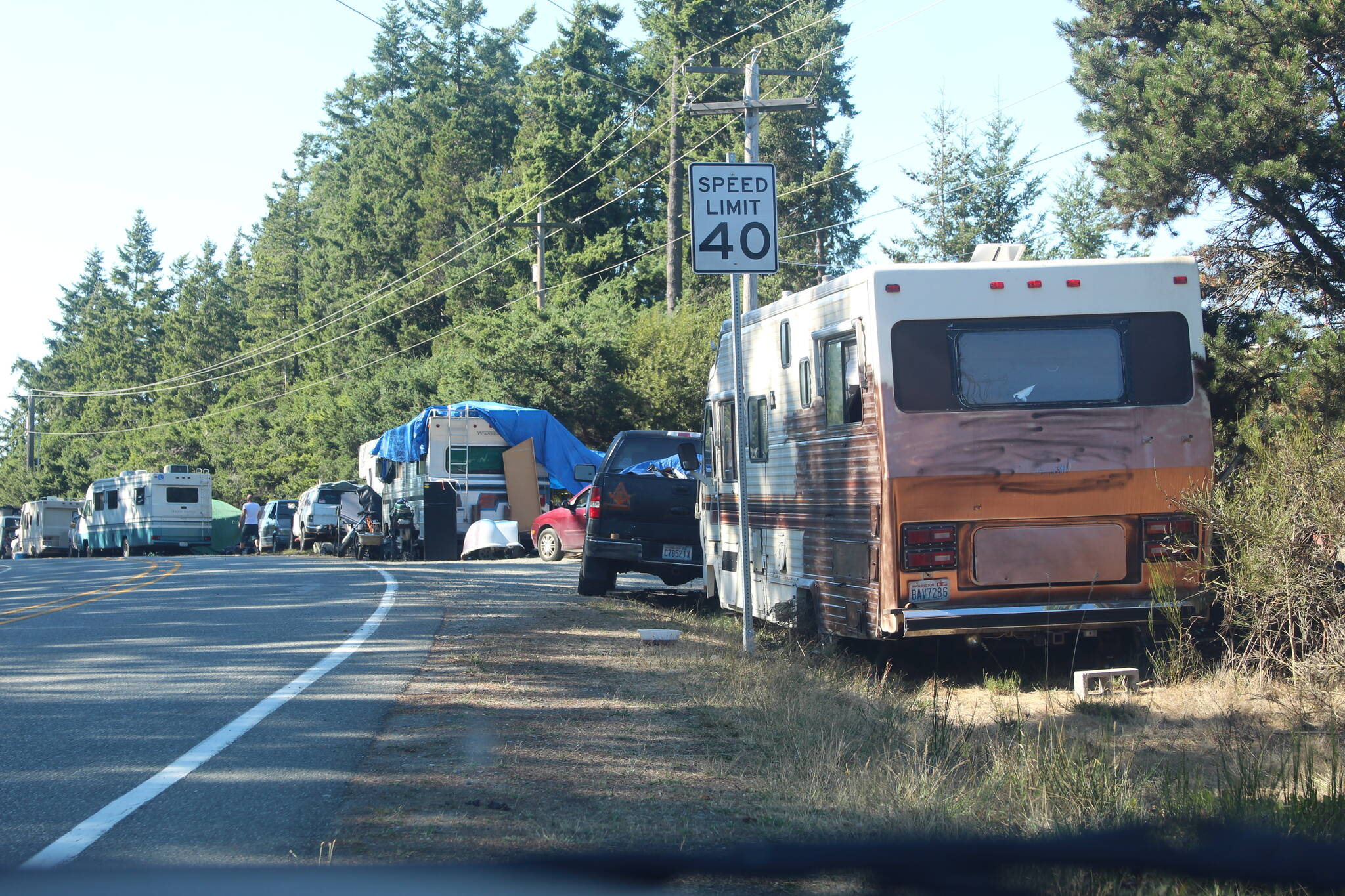As homeless encampments in Island County grow in number and size, county commissioners are considering what steps they can take to clean up these sites without violating the rights of the people who find shelter there.
A discussion between the commissioners, Sheriff Rick Felici and prosecuting attorney Greg Banks during a workshop meeting Aug. 9 painted a less-than-promising picture of the county’s capacity to resolve the issue any time soon. Between legal restrictions on displacing homeless people camping on public property, a lack of mental health and drug addiction care infrastructure at the state level and a dearth of affordable housing and emergency shelters on the island, options moving forward are limited.
Still, county commissioners are hopeful that over the course of future discussions, they will be able to find code and policy solutions that will provide temporary fixes while continuing to invest in the long-term needs of the community.
A homeless encampment on Hoffman Road on North Whidbey has grown steadily since it sprang up nearly a year ago; county Commissioner Melanie Bacon said there were as many as 25 vehicles there at the most recent count.
The encampment has caused concern among neighboring residents, who have complained of theft, trespassing, public defecation and trash dumping at the site. Felici added that other Island County residents who do not reside in the homeless encampment have also taken to dumping their garbage at the encampment.
It isn’t the only such camp that has existed in Island County in recent months; in May, another encampment formed near The Home Depot in Oak Harbor, and county commissioners discussed an encampment on private property on Jones Road that county officials were able to clean up recently.
Banks told commissioners that the typical process for removing vehicles left on a public road is straightforward; law enforcement officers notify the owner of the vehicle that it will be towed, usually by leaving a sticker on the vehicle. If the owner does not move the vehicle, law enforcement can have it towed and impounded. The vehicle owner may contest the validity of the impound within 10 days, or pay the impound fee to have the vehicle returned to them. If the impound fee is not paid, the county may then dispose of the vehicle as it sees fit.
Felici said that while this is the standard procedure, court challenges that have occurred in similar camps in communities like Oak Harbor stymie the Sheriff’s Office’s ability to enforce these parking laws.
“Towing the vehicle is one thing,” Felici said. “What do you do with the person that’s in it?”
Martin v. Boise, a 2018 decision by the U.S. Court of Appeals for the 9th Circuit, states that municipalities cannot enforce anti-camping ordinances on public property without providing an alternative shelter. Additionally, the City of Seattle v. Long, a 2021 Washington Supreme Court decision, prevents municipalities from impounding vehicles that are being used as residences.
The Martin v. Boise decision was effectively upheld in the more recent Johnson v. City of Grants Pass, which prevented the Oregon city from using a roundabout method to remove homeless people from public property without providing alternative shelter, Banks explained. These cases, taken together, greatly limit the types of codes the county could implement or enforce that would break up these encampments.
No action was taken at this workshop meeting regarding homeless encampments; rather, commissioners said this discussion will be a starting point from which to brainstorm ideas for codes that could be legally enforced to address the concerns of Hoffman Road residents without violating the rights of the people residing in homeless camps there.
Unfortunately, as Felici pointed out, moving people from encampments where they currently reside will only result in encampments springing up elsewhere as long as there are no other shelters for them to go to; he likened the situation to a game of whack-a-mole.
Banks concurred, calling enforcement of parking and camping codes a “Band-Aid” over a much larger problem.
“We’re a little late to the game at that point to be finding systemic solutions,” he said, stating that for the time being, the most the county can do is to disincentivize code violations.
Commissioners also acknowledged the complexity and depth of the issue; Commissioner Janet St. Clair noted that over the last 30 years, the state has deconstructed its mental health care system. While looking at temporary fixes to problems caused by existing homeless encampments, the county also needs to invest concurrently in systems of care, she said.
Commissioner Jill Johnson said that frustration over a lack of investment in mental health and drug addiction care at the state level is what prompted a recent joke on the internet referring to the Hoffman Road encampment as “Jay Inslee’s Campground.”
Internet trolls recently marked Hoffman Road on Google Maps with the title, referring to the Washington state governor. Commenters shared tongue-in-cheek reviews of the “campsite.”
Johnson said that without investment in care systems at the state level, Island County and its homeless population will remain trapped in their current state. Issuing fines for non-compliance with parking and camping regulations ultimately amounts to fining people for being poor, struggling with drug addiction or facing untreated mental health challenges, she said. Because people in these circumstances are often unable to pay fines, anyway, the issue effectively goes untreated.
“In reality, this is such a broad systemic failure that is not Island County related,” she said.



